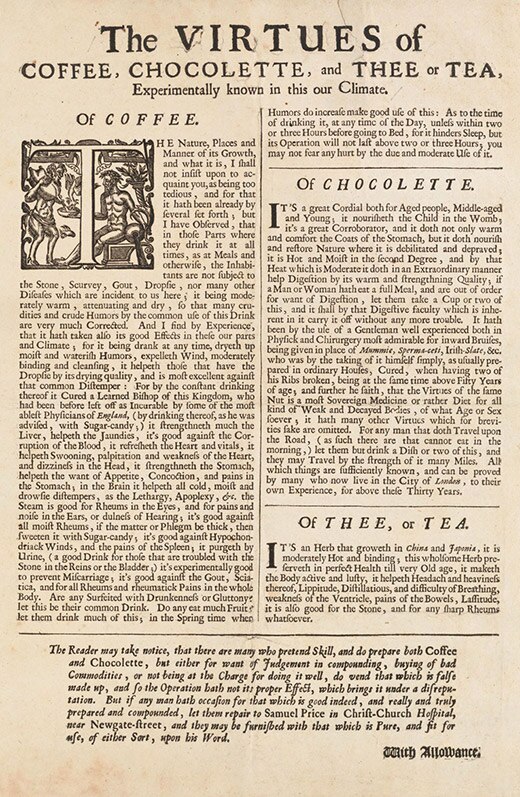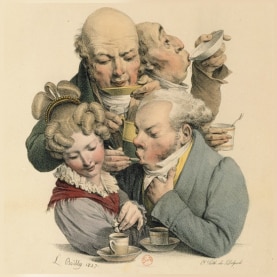The bitter success of coffee
Coffee has always sparked debate, enjoying widespread popularity while also being subjected to criticism. Numerous studies now show the beneficial properties of this beverage, its stimulating effects as well as its role in the prevention of chronic diseases. While coffee merits its place as part of a balanced diet, specialists remain cautious and recommend a moderate daily intake.
Constant interest in coffee
Consumed in the Muslim world from the 15th century and in Western and Christian Europe from the 17th century, coffee has always sparked debate, proving popular everywhere, while also being blamed for various ailments. Its power as a stimulant has undeniably played a major role in the popularity of this beverage. The Turks extolled its effects on digestion and on the ability to stay awake. Europeans also appreciated these qualities and attributed coffee with all sorts of medicinal virtues too, to the point of making it a panacea.
Some forty years after the first coffee houses opened in England, Samuel Price, a London coffee merchant, summed up the extraordinary health benefits of the drink in his advertisement, dated around 1690 (see illustration). He claimed that coffee refreshed the heart and vital functions, fortified the liver and stomach, purified blood and stimulated appetite. It was believed to combat apoplexy and tinnitus, and also to prevent miscarriages. However, some 17th and 18th century doctors thought consuming coffee had harmful effects. They claimed it attacked the brain, burnt the blood, led to dreadful weight loss, affected the nervous system and could even cause infertility and impotence.
Today, coffee is one of the world’s most popular drinks, after water and tea. The way it affects health is of particular interest to the medical field; the number of studies carried out on humans and animals, meta-analyses and developments have multiplied in recent decades. While some results have appeared contradictory, requiring a certain amount of caution when interpreting them, moderate consumption of coffee is no longer considered a health risk for the general public.
The virtues of coffee
Coffee contains a dozen bioactive compounds, in varying quantities depending on the variety of the beans and how they are roasted and prepared. The most frequently studied active substance is caffeine. Renowned as a stimulant, it has an effect on brain activity, favouring cognitive performance through increased vigilance and attention, but also negatively affects the ability to fall asleep and the quality of sleep. Caffeine can also influence physical performance during endurance sports. It is also regularly cited for it diuretic properties, and the fact that it may favour bowel function and reduce the intensity of headaches. It also has a reputation for being a ‘fat burner’ and is therefore found in a number of slimming products. Caffeine may well lead to a slight increase in basal energy expenditure and help eliminate fat by activating lipolysis (the breakdown of lipids) in the adipocytes (cells specialised in storing fat), yet the benefit of consuming caffeine in order to lose weight is, for the moment, far from proven.
As the composition of coffee is complex, the numerous substances it contains can have different and sometimes contradictory effects, for example in the case of cardiovascular diseases. Caffeine increases blood pressure and the molecules called diterpenes (cafestol and kahweol), especially found in unfiltered boiled coffee, increase cholesterol slightly. However, the antioxidant properties of polyphenols, also present in large amounts, protect the cardiovascular system and are thought to compensate for these ill effects. Hence, a moderate consumption of coffee (around 3 cups a day) is, on the whole, considered beneficial to health.
Most recent research has shown that coffee could reduce the risk of developing Parkinson’s disease, Alzheimer’s disease and type 2 diabetes. While coffee has long been suspected of being carcinogenic, in 2016, the International Agency for Research on Cancer (IARC, part of the WHO) carried out an assessment of hundreds of studies and concluded that there was no carcinogenic risk. In fact, their review shows that coffee reduces the risk of liver and endometrial cancer, and that it does not affect pancreatic, breast or prostate cancers.
To be consumed in moderation
Thanks to its various qualities, coffee today merits its place as part of a balanced diet. However, the principle of moderation prevails and it is recommended not to exceed a daily dose of around 300 mg of caffeine, the equivalent of three cups of coffee. Pregnant or breastfeeding women are advised to aim for a more moderate caffeine intake, less than 200 mg a day.
Bologne, Jean-Claude. 1991. Histoire culturelle et morale de nos boissons. Paris : Robert Laffont, 1991.
Costentin, Jean et Delaveau, Pierre. 2010. Café, thé, chocolat. Les bienfaits pour le cerveau et le pour le corps. Paris : Odile Jacob, 2010.
EFSA Panel on Dietetic Products, Nutrition and Allergies (NDA). 2015. Scientific Opinion on the safety of caffeine. EFSA Journal. 2015, Vol. 13, 5, p. 4102.
EFSA Panel on Dietetic Products, Nutrition and Allergies (NDA). 2011. Scientific Opinion on the substantiation of health claims related to caffeine and increase in physical performance during short-term high-intensity exercise (ID 737, 1486, 1489), increase in endurance performance (ID 737, 1486), increase in endurance[...]. EFSA Journal. 2011, Vol. 9, 4, p. 2053.
EFSA Panel on Dietetic Products, Nutrition and Allergies (NDA). 2011. Scientific Opinion on the substantiation of health claims related to caffeine and increased fat oxidation leading to a reduction in body fat mass (ID 735, 1484), increased energy expenditure leading to a reduction in body weight (ID 1487) [...] . EFSA Journal. 2011, Vol. 9, 4, p. 2054.
Haller, Pol Nicolas Guy. 2013. Le café: les effets bénéfiques et néfastes sur la santé. [En ligne] 2013. [Citation : 10 01 2017.] http://docnum.univ-lorraine.fr/public/BUPHA_T_2013_HALER_POL.pdf.
Loomis, Dana, et al. 2016. Carcinogenicity of drinking coffee, mate, and very hot beverages. Lancet Oncology. 2016, Vol. 17, 7, pp. 877-878.
Nehlig, Astrid. 2014. Café&Médecine en 20 questions (3e Edition). [En ligne] 2014. [Citation : 22 01 2016.] http://www.santeetcafe.com/editions/ouvrages-cafe-et-medecine/.
Nehlig, Astrid. 2012. Effets physiologiques du café et santé humaine. Une revue. Cah Agric. 2012, Vol. 21, 2-3, pp. 197-207.
O'Keefe, James H, et al. 2013. Effects of habitual coffee consumption on cardiometabolic disease, cardiovascular health, and all-cause mortality. Journal of the American College of Cardiology. 2013, Vol. 62, 12, pp. 1043-1051.
OMS / WHO. 2016. Les Monographies du CIRC évaluent la consommation de café, de maté et de boissons très chaudes. [En ligne] 15 06 2016. [Citation : 17 01 2017.] https://www.iarc.fr/fr/media-centre/pr/2016/pdfs/pr244_F.pdf.
Shapiro, Robert E. 2008. Caffeine and headaches. Current Pain and Headache Reports. 2008, Vol. 12, 4, pp. 311-315.
Vanier, Paulette. 2014. Le Café. Passeportsanté. [En ligne] 2014. [Citation : 10 01 2017.] http://www.passeportsante.net/fr/Nutrition/EncyclopedieAliments/Fiche.aspx?doc=cafe_nu.
Xavier, Jessica. 2010. Pause café, pause beauté. Doctissimo. [En ligne] 2010. [Citation : 10 01 2017.] http://www.doctissimo.fr/html/beaute/soins-du-corps/articles/14218-pause-cafe-pause-beaute.htm.






